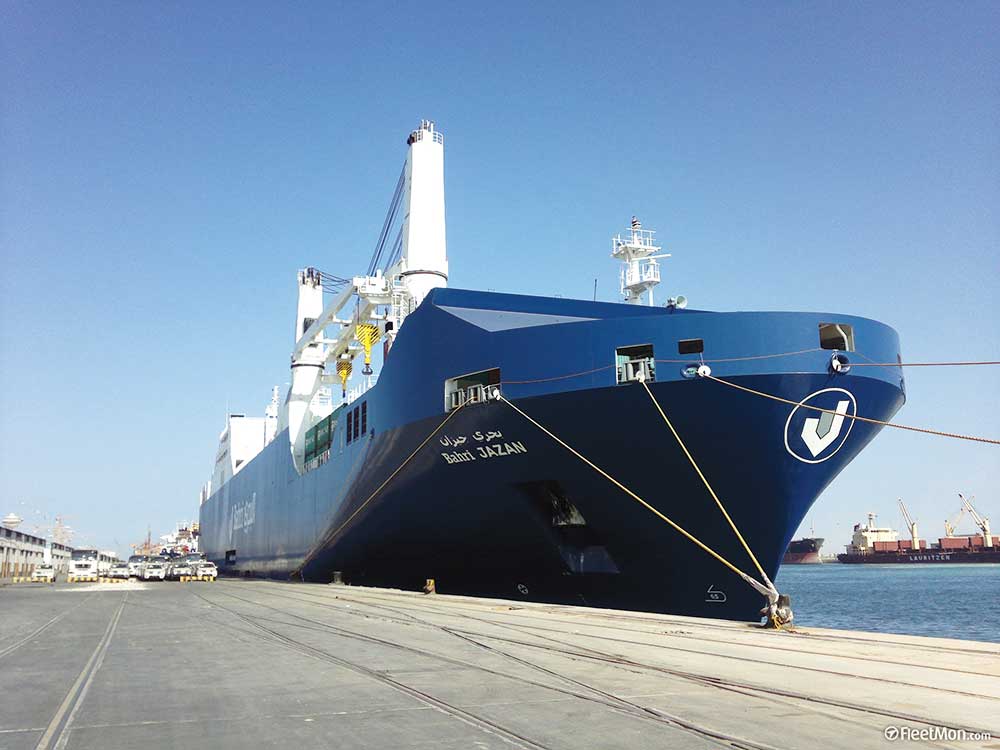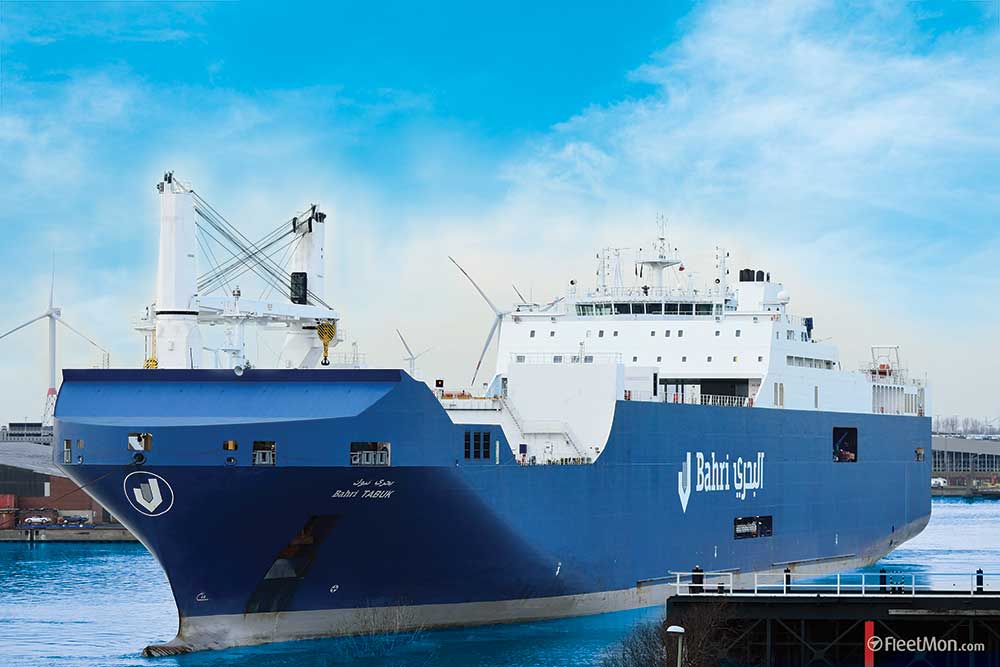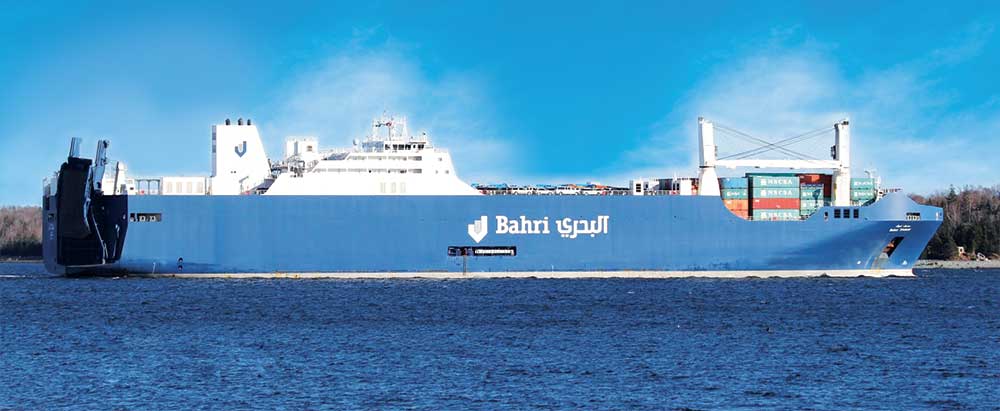Bahri Logistics, formerly known as the National Shipping Corporation of Saudi Arabia, recently appointed United Liner Shipping Services as its agent in India. The logistics division was the first business unit established within the Bahri Group and today it is one of the top ten break-bulk carriers in the world.
Bahri Logistics operates six state- of-the-art multipurpose vessels each of 26000 DWT. Bahri's vessels offer a unique solution for parcels, since break-bulk and containerised shipments can be moved together under a single document. The company runs a regular liner schedule from India to major ports in the Persian Gulf, the Mediterranean, the US east coast and the Gulf. The business unit serves global multinationals and various Saudi government entities through long- term contracts. It is the exclusive logistics provider for both the Ministry of Defence and the Ministry of Interior in the Kingdom.
Bahri Logistics, in combination with the extensive network and logistics capabilities of the JMB GROUP, aims to increase the number of calls it makes in India and to add new service lines in the near future. Captain Bhosale spoke to us at length about Bahri's vision, its plans in India and its expectations of the collaboration.
Q: The Bahri India to US service has been in operation for 20 years now. What are the drivers that contribute to the success of this service?
Ans: With more than 38 years of heritage, Bahri Logistics has a novel approach with its focus on the optimal cargo mix whilst specialising in under deck storage capability. Our multipurpose vessels, with an average age of less than 4 years, are all uniquely designed to carry multiple types of cargo in a single voyage, including project, ro-ro, break-bulk (heavy-lift) and container cargoes. We are the leading direct full liner service provider from Mumbai to US East Coast ports, including way- port calls along the liner service route in the Mediterranean and Europe. Four vessels connect the United States to Saudi Arabia and major ports in the Persian Gulf, the Indian subcontinent and the Mediterranean, and two vessels connect Europe to Saudi Arabia and key ports in the Persian Gulf and the Mediterranean. In India, this direct westbound coverage with liner schedules from Mumbai gives Bahri a unique selling point compared to the competition.
Bahri logistics team is led by Captain Jiten Bhosale. He has a wide range of experience from having handled various types of ro-ro cargo, both in his sailing days and as a port captain for Wilhelmsen Ship Management. In 2010, he joined Hoegh Autoliners as a port captain in Mumbai and later he progressed to Dubai as regional head of operations for the Middle East, the Indian subcontinent, Singapore and Africa. In May 2016, he returned to India as the head of Bahri India. With his extensive experience and commercial acumen, he is successfully leading Bahri to become a force to be reckoned with in the Indian break-bulk space.
Q: Could you please give us some insights on the Bahri organisation that deals with the India service?
Ans: Bahri Logistics officially set up a new branch office in India in February 2017. The opening of this new office in Mumbai was a strategic long-term investment by Bahri and it underscores the company’s strong commitment to the Indian market as we look to expand into other verticals of the marine transportation industry. Previously, Bahri had operated in India as a liaison office, working with agents. The Bahri Logistics team has nine employees in India, who manage operations, sales, documentation and accounts.
Q: Your vessels can carry multiple cargo types. What is you preferred mix?
Ans: Bahri vessels are multipurpose vessels equipped with two heavy lift cranes giving a total of 240 MT of lifting capacity. They have a large stern ramp of 250 MT and all the necessary equipment onboard. Ideally, the carrying capacity of these vessels is configured 70-20-10, which means 70 per cent for break bulk, 20 per cent for ro-ro and 10 per cent for containers. Our preference is for project cargo, especially with the versatile handling capacity of our vessels due to the high ramp door and the LoLo operational capability.

Q: What difference do you think the introduction of ULSS as your agent will make to the service and the profile of customers using the service?
Ans: Bahri has ambitious plans in India with its long-term commitment to the Indian market. In view of this, Bahri needed a partner with extensive pan-India coverage who would work in tandem with us for future opportunities. J M BAXI GROUP is a well-established set-up with a detailed insight of the Indian shipping market, along with inland options. With J M BAXI GROUP’s extensive network, Bahri will be able to make positive proposals for hinterland projects including inland logistics.
Q: The market knows Bahri as a shipping line serving the Persian Gulf, Mediterranean ports and the US. Is Bahri also in a position to service other sectors?
Ans: As well the two services offered by Bahri, we are exploring other opportunities, such as a feeder service from Chennai and the African market.
Q: Who do you consider as your major competitor?
Ans: For Bahri, the competition is with ro-ro, break-bulk and container players westbound from Mumbai. Hoegh is a partner in the Veracruz sector, whereas it is a competitor in the Red Sea, Mediterranean and US sector. Break-bulk operators such as BBC and Hansie are always in the market for spot shipments. For container, Bahri competes against major line operators who have similar trade lanes.

Q: Do you see other areas of opportunity for cooperation between J M BAXI GROUP and Bahri?
Ans: There are various opportunities for Bahri and JMB Group to work together, especially for inland transportation, yard management, feeder services, freight-forwarding support, etc. Discussions along with specific studies are in the pipeline. J M BAXI GROUP has close relations with government projects in which Bahri could participate. Presently, Bahri intends to settle in with its present trade routes and to improve them.
Q: From your experience in operations, what improvements would you like to see in port operations in India
Ans: The major auto manufacturers use various ports on the west coast, causing multiple port calls. Our challenges are port congestion along with high port costs. The handling of ship equipment (such as Mafis), the positioning of cargo handling equipment, etc. need to be streamlined by Mumbai Port. Mumbai Port has restrictions, such as draft restrictions, berth load densities, the limited storage area in the vicinity of vessels, the lack of cargo handling equipment, etc.

